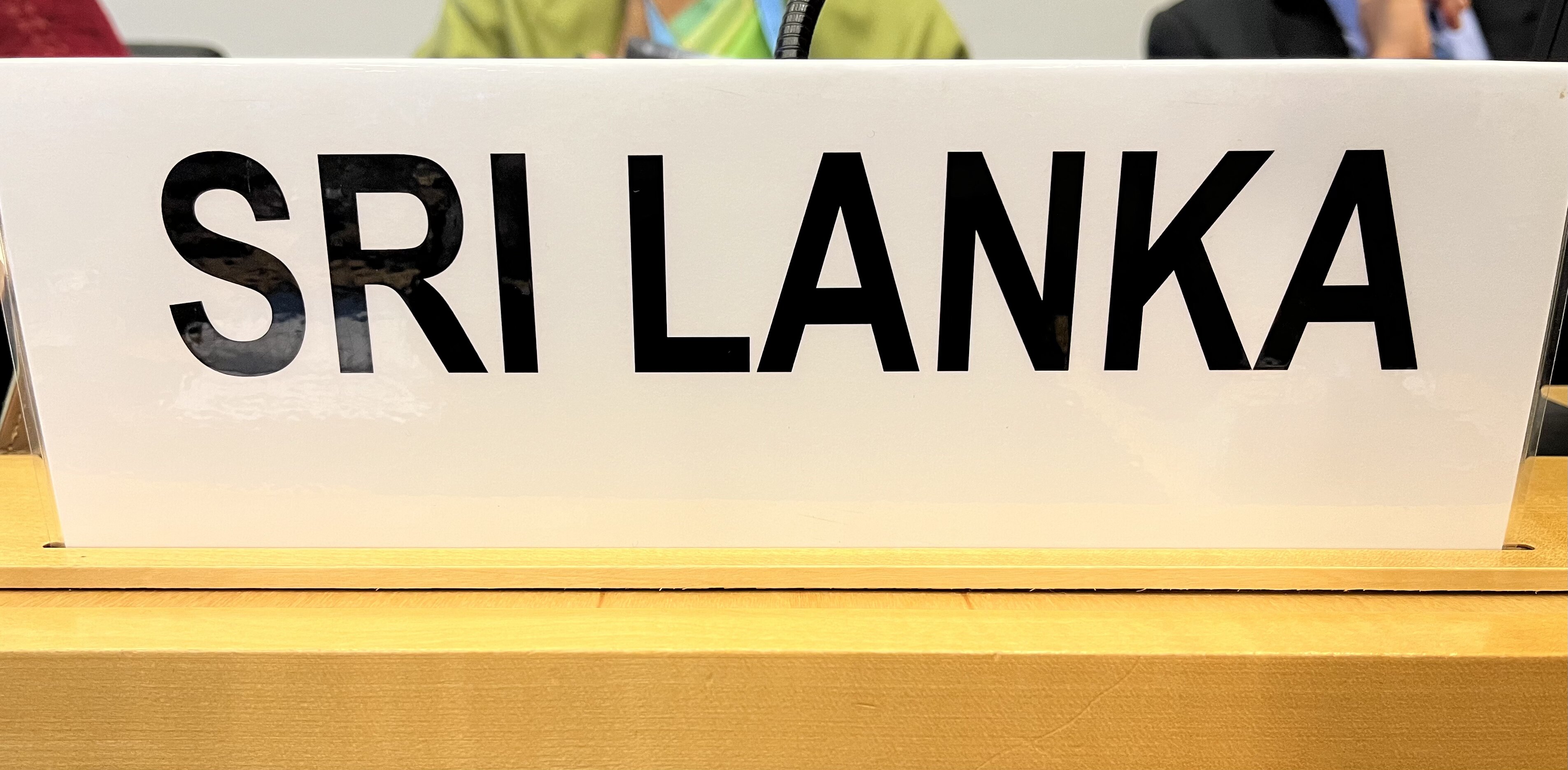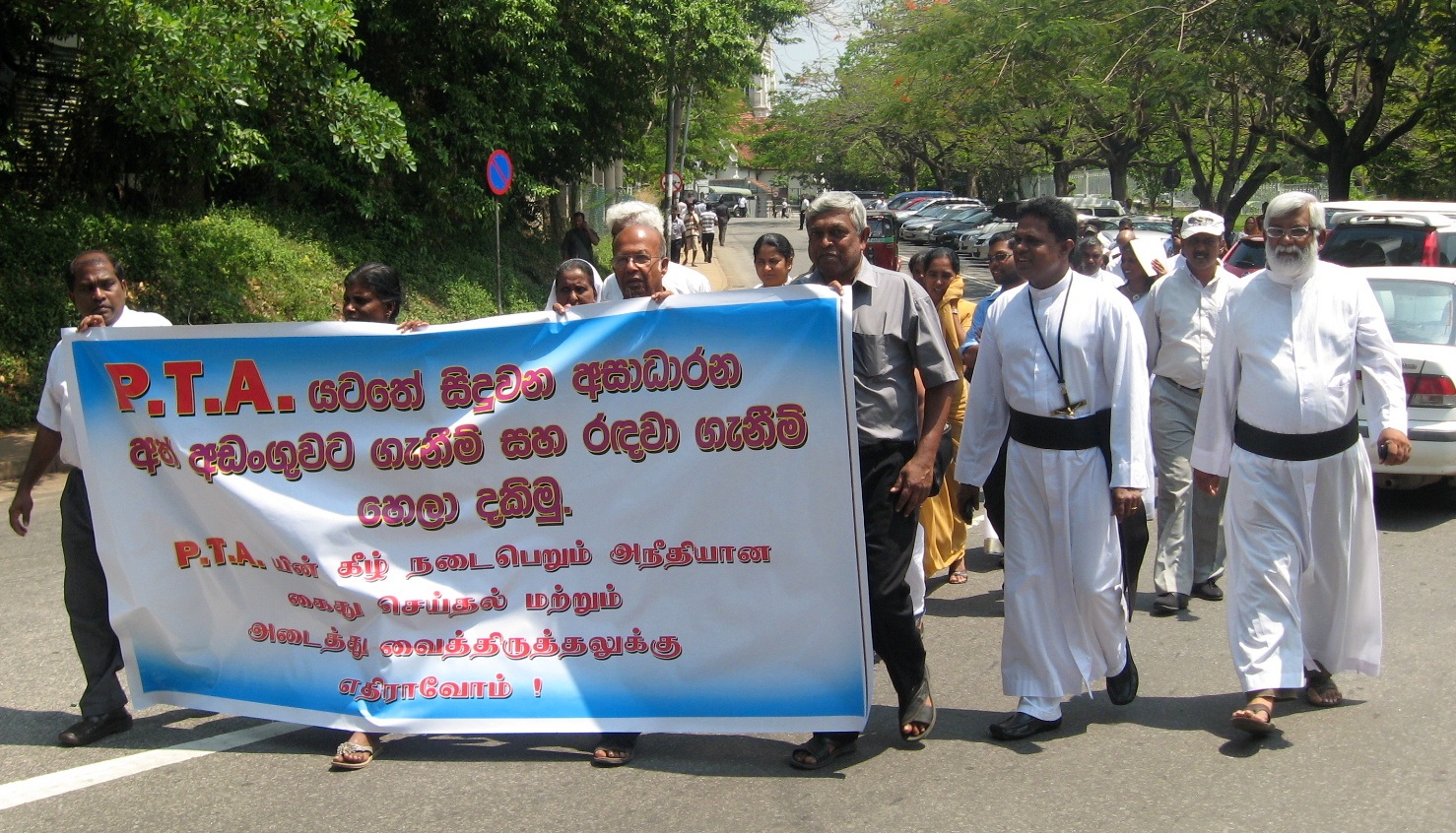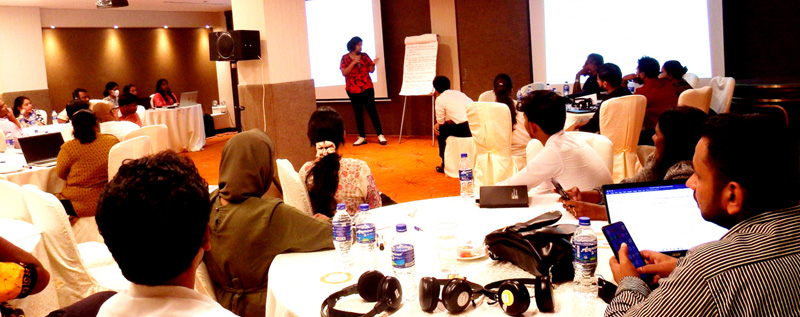Sri Lanka finally reviewed by the Committee after two postponements
Published on 22 Mar 2023, 05:31 PM
During its 137th session, the Human Rights Committee considered the sixth periodic report of the Government of Sri Lanka
 Sri Lankan delegation at the Human Rights Committee in Geneva
Sri Lankan delegation at the Human Rights Committee in Geneva
The review of Sri Lanka by the Human Rights Committee (the Committee) was held on 8 and 9 March 2023 in a hybrid format. As 8 March marked International Women’s Day, the Committee’s chairperson opened the session with remarks on the gap that still exists in achieving gender equality worldwide and the opportunity for those in a position to help achieve gender equality to renew their commitment.
The Sri Lankan delegation led by the Permanent Representative of Sri Lanka to the UN in Geneva, Himalee Arunatilaka, recalled the country’s commitment to respecting, protecting, and promoting human rights for all its citizens. Among the main recent developments outlined were notably the adoption of the 21st constitutional amendment in October 2022, and the amendments to the Prevention of Terrorism Act (PTA) in March 2022 and subsequent steps to develop anti-terrorism laws balancing national security concerns and compliance with international standards and best practices. Worryingly, the Committee asked about the role of Major General Kulatunga, a member of the State delegation, as commander at the Joseph Military Camp, where multiple allegations of torture have been made.
Key issues raised by the Committee included the lack of clarity on the status of promised constitutional reform and whether the 21st amendment to the Constitution really limits executive power, or the persistence of sexual and gender-based violence (SGBV) and gender inequality.
21st Constitutional amendment & power of the executive presidency
The Committee raised the issue related to the power of executive presidency, which undermines the independence of the judiciary and other oversight institutions. It requested the Sri Lankan delegation to clarify what could be done to safeguard the independence of the judiciary and other oversight institutions responsible for the protection of human rights in future amendments. The Committee also asked for explanations on the substantive differences introduced in the 21st amendment to ensure the independence of the Constitutional Council (CC) from the executive and what steps could be taken to prevent potential political influence over the CC and improve its transparency.
The Sri Lankan delegation responded that the positive features of both the 19th and 20th amendments were kept in the 21st amendment, the latter also having brought in significant positive aspects. It was highlighted that the CC’s member appointment process under the 21st amendment included requirements of professionality, social diversity, eminence, and integrity.
Prevention of Terrorism Act (PTA)
 Anti PTA protest in Sri Lanka. By Kishali Pinto Jayawaradene
Anti PTA protest in Sri Lanka. By Kishali Pinto Jayawaradene
The Committee questioned the Sri Lankan delegation about when the current PTA would be repealed or replaced, whether the Government had considered amending the Penal Code instead of adopting a new law, as well about the inclusion of lacking fair trial guarantees in the new draft law, its publication, and consultation with civil society on it. The Committee also pointed out the numerous cases of detention and rights deprivation under the PTA and requested for more information on these cases, on the measures taken to improve the fairness of trials and on how the review process to challenge convictions under the PTA complied with the ICCPR.
The Sri Lankan delegation replied that the March 2022 amendments to the PTA were adopted after extensive deliberations with relevant stakeholders, including civil society representatives, and highlighted that the amendments provide for safeguards. The delegation also confirmed that a new anti-terrorism bill had been drafted and there would be an opportunity for public scrutiny and for challenging the bill.
Gender-Based Violence & Gender Equality
The Committee inquired about the main results of national plans relevant to SGBV, the status of the draft amendments to the Prevention of Domestic Act (PDA); the progress on the criminalization of marital rape; measures to address the lack of reporting of SGBV and obstacles to effective access to justice by victims; and on government actions to ensure effective and expeditious investigation, prosecution and sentencing of perpetrators. It also flagged the urgent need to address the gender bias contained in some land and inheritance laws, and deplored the slow progress in bringing the Muslim Marriage and Divorce Act (MMDA) in line with the ICCPR, the underrepresentation of women in parliament, and the persecution of women candidates in past parliamentary elections. It requested or explanation on the measures taken to address discriminatory media statements slandering women.
The Sri Lankan delegation assured that it was working on removing discriminatory provisions from land and inheritance laws, that discussions about amendments to the MMDA were ongoing, and that new legislation or legal revisions would be considered in regard to sexual bribery and marital rape. The delegation also highlighted the implementation of a significant part of its current SGBV National Action Plan, the creation of new action plan for 2023 to 2027, and the upcoming submission of the draft PDA amendments to the Cabinet.
Freedom of religion or belief of minority religious communities
The Committee pointed out the wide use of counter-terrorism laws against religious minorities, the targeting of their places of worship and continued violence, hate speech, and persecution against them. The Committee requested the Sri Lankan delegation to explain the lack of effective legal protection of religious minorities against such acts and measures to prevent ethno-religious hostility. It also questioned the delegation on government restrictions on freedom of religion and belief both in law and in practice, the unequal treatment of religion in favor of Buddhism, the protection of proselytism, the lack of clarity and registration requirements of religious organizations or places of worship, and the targeting of religious minorities and their worship sites.
The Sri Lankan delegation recalled the Government’s commitment to ensuring security and safety for all its citizens, regardless of their religious or ethnic background, and on its efforts to prevent extremist violence and encourage inter-religious dialogues across the country.
Recommendations from the Human Rights Committee
Concluding Observations on Sri Lanka sixth periodic report were released on March 24, 2023.
The State party is requested to provide, by 24 March 2026, information on the implementation of the following recommendations:
Human Rights Commission of Sri Lanka
The State party should take all necessary measures to ensure that the Commission fully complies with the principles relating to the status of national institutions for the promotion and protection of human rights (the Paris Principles). It should ensure the transparency in the appointment process of the Commission and provide it with sufficient human and financial resources to carry out its mandate effectively and independently in all parts of the country.
Counter-terrorism measures
The State party should take concrete measures to:
- (a) Repeal the Prevention of Terrorism Act and replace it with legislation that narrows the definition of terrorism and is compatible with the Covenant and the principles of legal certainty, predictability and proportionality;
- (b) Ensure that the legislative process for enacting a new anti-terrorism or national security law is inclusive and transparent and facilitates the free, open and meaningful participation of a wide range of stakeholders, including the Human Rights Commission of Sri Lanka, civil society and the public;
- (c) Ensure that individuals suspected of, or charged with, terrorist acts or related crimes are provided, in law and in practice, with all appropriate legal safeguards, particularly the right to be informed of the charges against them, to be promptly brought before a judge, and to have access to legal counsel, in line with article 9 of the Covenant and the Committee’s general comment No. 35 (2014) on liberty and security of person;
- (d) Facilitate independent, effective and regular monitoring of all places of detention without prior notice and on an unsupervised basis, including by the Human Rights Commission, to carry out inspections of the situation of individuals detained under the Prevention of Terrorism Act;
- (e) Ensure that all deaths in custody are promptly, independently and effectively investigated, that perpetrators are held accountable, with penalties commensurate with the seriousness of the crimes, and that victims’ families are provided with full reparations.
Liberty and security of person
The State party should redouble its efforts to ensure:
- (a) That all allegations of arbitrary arrests and detention, particularly of government critics, protestors, trade unionists and members of minority groups, are promptly, effectively and independently investigated, that those responsible are brought to justice and that victims are provided with full reparations;
- (b) All persons deprived of their liberty are afforded, in law and in practice, all the fundamental legal and procedural safeguards from the outset of their detention, in particular, the rights to promptly contact a family member or any other person of their choice, to have prompt and confidential access to a qualified and independent lawyer or, when needed, to free legal aid, in line with the Basic Principles on the Role of Lawyers, to have access to a medical examination by an independent doctor and to be promptly brought before a competent, independent and impartial court within a maximum period of 48 hours;
- (c) Pretrial detention is only used as an exceptional measure and for a limited period of time, that the use of alternative measures to pretrial detention, as provided for in the United Nations Standard Minimum Rules for Non-custodial Measures (the Tokyo Rules), is increased, and that the length of pretrial detention is properly taken into account when a final sentence is determined.
Here you can find all the recommendations given by the Committee in the Concluding Observations.
The follow-up report of Sri Lanka on the implementation of the recommendations is due in 2026. The next list of issues will be adopted in 2029, and the next periodic report is due in 2030.
 Sri Lankan delegation at the Human Rights Committee in Geneva
Sri Lankan delegation at the Human Rights Committee in Geneva



